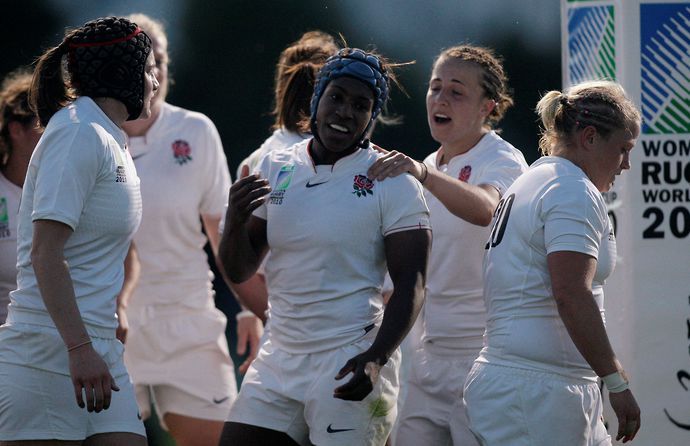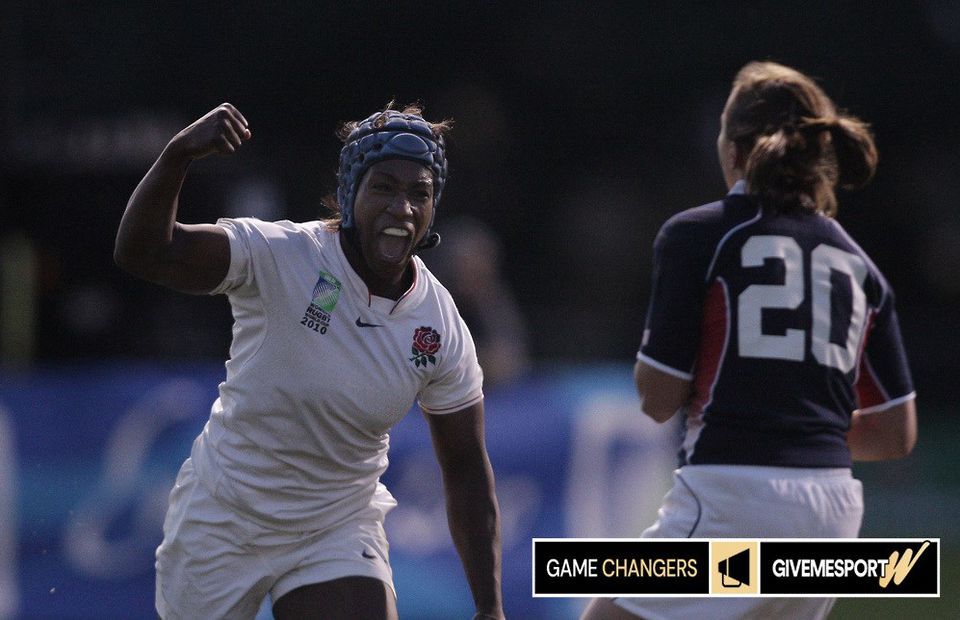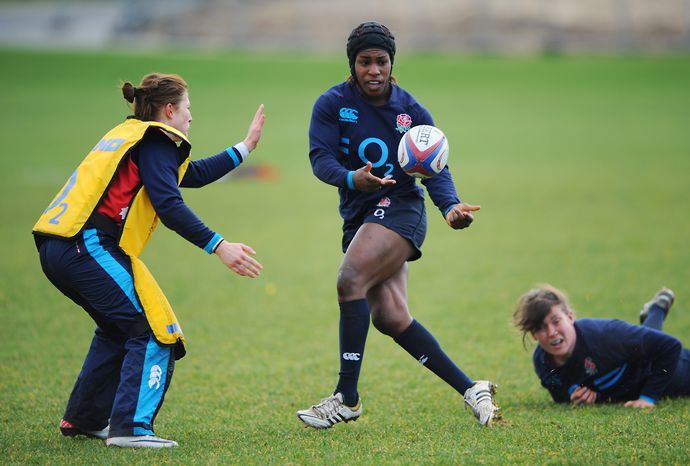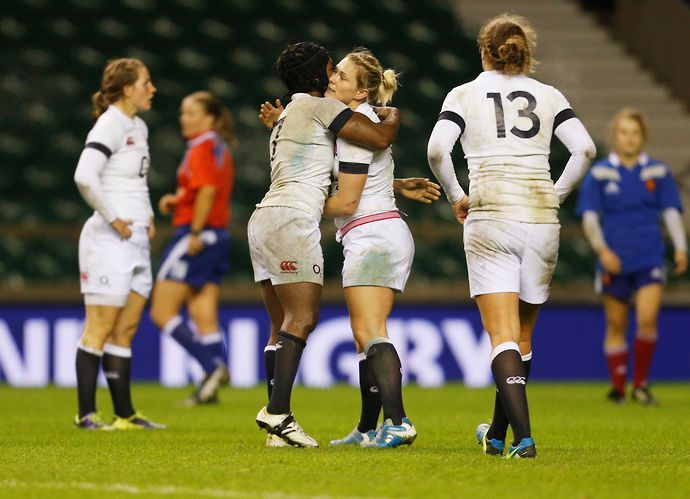The “Machine” is how Maggie Alphonsi became known following her exploits at the 2010 Women’s Rugby World Cup. Her relentless tackling and imposing ball-carrying led to her recognition as one of the finest players in the game and garnered immense plaudits from newly inspired fans.Powerful, intelligent, inspiring –– three traits synonymous with Alphonsi’s playing days, but also representative of her demeanour away from the game. Indeed, Alphonsi is far more than just a former Rugby player, but an advocate for equality, a pioneer for female pundits and a role model for women everywhere.An illustrious career, which includes 74 England caps, a World Cup triumph and a profusion of individual accolades, Alphonsi is undoubtedly a true Rugby icon. This success, however, was not achieved effortlessly, as the 37-year-old fought her way to the top of the game.Alphonsi’s story is one of gratitude for her upbringing, acceptance of her identity and appreciation for the chance to discover her passion. A beacon of hope for aspiring players everywhere, the Hall of Famer is living proof that women can achieve anything they set out to do.
From failure to flanker
Born with a birth defect known as Clubfoot, Alphonsi’s right foot is turned in –– resulting in countless injury problems and specific training regimes. Remarkably, despite having such a profound impact on her body, Alphonsi has never been phased by what could be considered a disability.
17-years of playing provoked hamstring tears, back problems and even career-threatening knee troubles, all related to her Clubfoot. But she persisted, she battled, she even had her foot corrected at one stage –– and her success now speaks for itself.
It’s this inherent, persevering temperament that led Alphonsi to the pinnacle of Rugby. Growing up on a Lewisham council estate, in a single-parent family, many who surrounded her either lacked ambition or knew not what they could achieve.
Alphonsi credits her mother as the reason for her mentality –– being behind her every step of the way, and giving her the freedom to pursue her dreams.
"Opportunities were low. My mum was a single parent and an amazing woman, she had two jobs so I could have a life," Alphonsi told Sky Sports News.
Like her mother, the former Saracens flanker was driven and determined to flourish. From a young age, she was frequently reminded that: “If you want to be successful, you have to work really, really hard, go above and beyond, it was drummed into us.”
At times though, Alphonsi’s youthful exuberance got the better of her. She prioritised socialising above her studies and was frequently reprimanded by her school headmaster. It was a conversation with her then teacher Liza Burgess that eventually led her on the right path.
Suggesting rugby as a way of channelling her energy, Alphonsi admits she was sceptical at first and assumed Burgess to be mad. In her column for The Telegraph, she professed:
I was a girl, I was black. There simply weren’t many people like me who played rugby, or any top-level sport at all.
Going to her first Saracens training session, Alphonsi’s love for the game was instant. From being implored to reign in her vigour at school, suddenly there was a platform from which to thrive.
"It was the most amazing thing. I have always been strong and aggressive but I had never found a sport which matched my strengths,” she recounted to Sky Sports.“I was encouraged to be aggressive and I flourished in it and I did well."
Rugby had given her focus, purpose and aspirations for the future. Rugby had stopped her spiralling into a life of uncertainty. Rugby was the sport she was born to play.
“Maggie the Machine”
Having made her England debut in 2003, aged just 19, injuries blighted the early part of Alphonsi’s international career. It wasn’t until a home World Cup in 2010, where a string of standout, scintillating performances caught the eye of fans and neutrals alike.
Described by former England centre Will Greenwood as “an athlete of outstanding talent” and one who possesses “outstanding physical attributes,” Alphonsi encapsulated a nation that tournament as the hosts reached the final, before narrowly losing out to New Zealand.
Having attracted a new legion of fans to the game, Alphonsi was now a superstar. The “machine” as she became known, quickly established herself as one of the country’s standout athletes, winning the Sunday Times Sportswoman of the Year in 2010, before being honoured with an MBE for her services to rugby in 2012.
All of a sudden, Rugby was in the spotlight, in the newspapers, on the radio –– and Alphonsi was chiefly responsible.
In 2014, Alphonsi and the England team went one step better. A World Cup triumph on foreign soil. Named in the team of the tournament, the flanker was once again instrumental.
It was following this defining victory that Alphonsi realised her playing journey was complete. A horror knee injury had almost ruled her out of the tournament entirely, but typically she fought her way through it. Knowing that she’d be forced into retirement soon enough, lifting the World Cup trophy was as good an ending as one would have dreamed.
“Winning the World Cup was the perfect way to bow out and will always be the highlight of my international career,” she revealed in an article for Rugby Site.
In truth, Alphonsi accomplished all that was possible in a single career. Individual accolades, a Word Cup win and that perfect happy ending. But of course, as a lover of the game her association with the sport couldn’t stop just there.
A voice for all women
Alphonsi recalls putting Owen Farrell “on his backside” during a training session when she was younger. Indeed, she trained with the men’s side frequently during her England days and had idolised the likes of Richie McCaw growing up.
Yet, the World Cup winner and former Sportswoman of the Year has still endured torrid sexist abuse over the years, frequently being told that she’s unqualified to comment on men’s rugby and that she should stick to her own game.
Like every other aspect of her life, however, Alphonsi has taken this trolling in her stride and is continuing to set an example to aspiring women everywhere. The most crucial thing, as she puts it, is to keep working hard and gradually prove the doubters wrong.
“It’s important that people like me and many other women that work in the studio or who are commentators, continue to call out negative abuse like this because we’ve got to have a platform and we’ve got to keep doing our job and keep doing it well,” she stressed on BBC Women’s hour.
It’s not just a generation of rugby players she’s inspired either. Having made history as the first female pundit at the men’s 2015 Rugby World Cup, other sportswomen were quick to vocalise their praise online. England football legend Alex Scott, a fellow game changer in her own regard, expressed her support for Alphonsi on Twitter, praising ITV for “making this happen.”
Fittingly, Scott has since gone on to enjoy a prospering punditry career of her own, and it’s Alphonsi who’s responsible for inspiring not only her but a generation of aspiring female pundits, who were too scared to have a voice. Because of Maggie, the conversation surrounding female inclusion in men’s sport is by no means finished, but the ideology is slowly beginning to shift.
“It shows what can be done and I hope many more will follow in her and my footsteps,” she wrote for The Telegraph.
Equally, Alphonsi’s advocacy for equality extends beyond sexism as she has consistently spoken out against racism, condemning those who continue to perpetuate this discrimination. In an interview with Sky the rugby star exemplified:
I want to make sure the next generation has more opportunities and we are a world that is more accepting of each other.
Citing her platform on social media as an important place to speak out for what is right, Alphonsi is making a stand on behalf of those who can’t do so themselves. Her experiences have made her stronger and she is using this resilience to motivate, inspire and educate the world.
Inducted into the World Rugby Hall of Fame in 2016, Alphonsi will forever be remembered in rugby folklore –– forever etched in the annals of history, forever the figure who put women’s rugby on the map.
The next challenge though is not establishing a name for herself within the men’s game but promoting the women’s game itself. The Women’s Six Nations gets underway next week as BBC are set to showcase the finale.
With a brand new landmark global women’s competition to be launched in 2023, a potential lions tour on the cards and promises for further investment from World Rugby Chairman Bill Beaumont –– women’s rugby is ostensibly going from strength to strength.
As more names become familiar, more players become inspirations and more women become heroes, Alphonsi will perpetually be remembered as the trailblazer that catalysed this all.






















